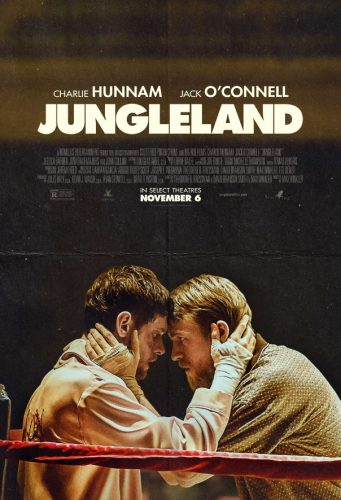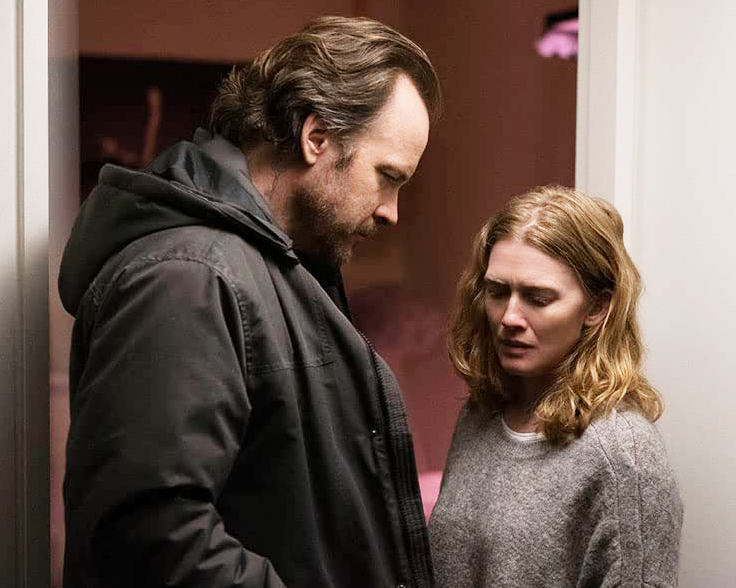Two former Toronto International Film Festival (TIFF) premieres, one from 2018 and one from 2019, finally make their way to audiences in the last quarter of 2020, offering different takes on the lengths people go to in service of family.
Veena Sud’s “The Lie” is a reunion between director/producer of AMC’s “The Killing” with main star Mireille Enos and final-season featured player Peter Sarsgaard. Since its premiere to a lukewarm reception at TIFF in 2018, it has wallowed with no signs of an official release. In the middle of this year, though, Amazon Studios acquired distribution rights for the film as part of an eight-film horror anthology, titled “Welcome to Blumhouse.”
 “The Lie” is bereft of the traditional features of a horror film but instead is working on multiple levels, and occasionally struggling to achieve a coherent through line. The film’s title both suggests and obfuscates its final resolution and tentative message, which has puzzled audiences and critics. But even before then, “The Lie” is an intriguing, if bizarre, film, floundering between high-octane exaggeration and social-more farce, while pushing the institution of family to its limits.
“The Lie” is bereft of the traditional features of a horror film but instead is working on multiple levels, and occasionally struggling to achieve a coherent through line. The film’s title both suggests and obfuscates its final resolution and tentative message, which has puzzled audiences and critics. But even before then, “The Lie” is an intriguing, if bizarre, film, floundering between high-octane exaggeration and social-more farce, while pushing the institution of family to its limits.
Enos and Sarsgaard play Jay and Rebecca, a divorced couple and parent to Joey King’s Kayla. Jay is driving Joey to a ballet retreat when they spot Kayla’s friend, Brittany, who seems stranded. A diversion in the woods for a bathroom breaks turns into something more sinister when Brittany disappears on a bridge over a lake – apparently at the hands of Kayla. Jay is embroiled with dealing with a dead teenager and a likely guilty daughter. From there, the couple must ignore their own romantic issues to cover for their daughter in a film that starts in an explosive high-key and keeps ramping it up, especially when Brittany’s suspicious father appears and turns a bad situation into something chaotic.
Little here suggests horror, although Sud’s flirtations with the tropes of a crime thriller – as Rebeca uses her background as a lawyer to outsmart the investigating officers – is occasionally sharp. But, more than a thriller, “The Lie” feels better considered as pure social-drama farce. It’s a curious mode for the story, which already seems to be battling a flimsy plot but it’s a curiosity that makes it feel compelling even when it veers off track. Enos, a perpetually underrated performer, delivers the film’s most incisive performance, valiantly uniting competing strands of Sud’s imbalanced narrative. It’s par for course as she earned career-best notices for her work on Sud’s “The Killing,” which was crucial to the show’s four seasons. Enos has always been adept at being a steadying force in potentially rocky narratives. The role of Rebecca here is not the best but she performs it with such gusto that by the middle-act of “The Lie” you commit to the ludicrousness just for the intensity she delivers.
Sarsgaard offers her good support albeit sometimes torn between matching the film’s own inherent farce with his penchant for realism but the twistier the film gets, the more amusing its incredibly improbable actions become. King is rockier as Kayla, stalling the momentum of the film when she must lead a scene. The descent into chaos ends on a final shot of such egregious madness, I find myself more amused at Sud’s impishness than annoyed at the film’s own casual commitment to anarchy. It’s a case of your mileage may vary but the final shot or incredulity on the faces of Sarsgaard and Enos justifies the madness in a way that makes “The Lie” a credible argument as to why one should never have children.
Like “The Lie,” Max Winkler’s “Jungleland” is about the lengths we’d go to help our loved ones. Its low-key register is nothing like the farcical heights of “The Lie”, though. Winkler’s film (he directs and co-writes) film premiered in 2019 at TIFF and is now rolling out for audiences. It’s a sombre drama that explores the lives of two brothers yearning for better. Lion is a taciturn and focused boxer managed by his older brother, Stan – who stands in as brother, father and sometimes exploiter of his brother’s talents. Their fates are compromised when a line of credit leaves the men at the mercy of a gangster that Stan has run afoul of. They must travel from the scraps of Massachusetts to California to fight in bare-knuckle boxing match, called “Jungleland,” to erase their debt. They also have to drop a young woman, Sky, in Reno as part of the deal. Sky is an unwilling package.
So, “Jungleland” becomes a kind of a road movie, undergirded by sadness and desolation as the two brothers butt heads even as they dream about a distant future where they don’t spend days running afoul of the law and squatting in empty buildings. Naturally, their unwilling travel partner poses a threat to their safety as well as their bond and from there “Jungleland” explores some familiar tropes. Winkler’s work as a director is more astute than his scriptwriting (he shares writing credits with Theodore B. Bressman and David Branson Smith). There’s an appealing bareness to the film’s aesthetic, amplified by Damian Garcia’s cinematography, which emphasises the realism of the work. “Jungleland” is not specifically an examination of American poverty, but it is exacting in the way it visually traces the struggles of the brothers.
Charlie Hunnam (as Stan) and Jack Lowden (as Lion) are both excellent. Hunnam, in particular, might be the best he’s ever been, giving a kind of loose and unpredictable performance that sometimes seems too unpredictable for the movie he’s in. Lowden is best opposite Hunnam making the reticent sensitivity of Lion into something more than just a plot-point. The film is less assured with the role of Sky. Jessica Barden is committed but the arc is the film’s weakest as it seems committed to seeing these characters make the worst decisions even when they seem more intuitive than the actions the script demands they take. Winkler does not have the confidence in the filial drama, and the film’s relentless focus on drumming up twists in the final act feels too spurious.
The elegiac note that it ends on is maybe a smidgen too grand for the contrivances that immediately precede, but it’s also impossible not to be moved by the sheer emotional commitment of the two leads. The result is I find myself thinking of the fate of the brothers even as individual moments from the film fade from memory. “Jungleland” might get lost in the current slate of new streaming releases, but it’s worth some time even if just for a tender depiction of brotherly love that becomes surprisingly moving.
“The Lie” is available on Prime Video, while “Jungleland” is available on VOD for streaming and purchase on November 10.






